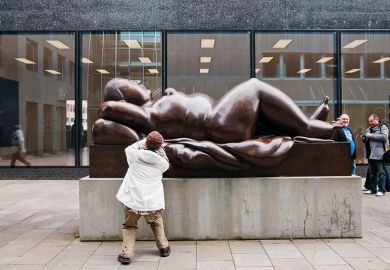There is something of a renaissance of interest in the work of Thomas Hill Green, a leading figure of British idealism in the late 19th century. The British idealists once held a formidable presence across the UK. Several were knighted; many helped establish new universities across England, Scotland and Wales; and they were all deeply involved in social reforms. Green was no exception: he served as an assistant commissioner for the Royal Commission of 1864, helped establish several universities in the north of England and was elected to the Oxford Town Council in 1876, among other activities.
In addition to the renewed interest in Green's work appearing more regularly in leading journals, an Imprint Academic book series is dedicated to publishing new work exclusively on Green's philosophy. The books in the series are most often substantively revised doctoral theses.
The series is to be congratulated: the quality of scholarship is exceptional. Too often, revised theses read much like theses. The series editors, led by eminent idealist scholar Peter Nicholson, have done very well in helping to produce this collection, one of the most exciting developments in the field of history of political thought.
One of Green's primary contributions to moral and political philosophy was his theory of positive freedom. This is the subject of Ben Wempe's fine T. H. Green's Theory of Positive Freedom , itself a substantially revised version of his Beyond Equality: A Study of T. H. Green's Theory of Positive Freedom , which was printed by the Dutch publisher Eburon in 1986. We might more readily think of freedom in negative terms, as the absence of restraint. I am free when I am unfettered; I lack freedom when I am encumbered. Green understands freedom in a positive way: I am free when I possess a capacity to do or enjoy something that is worth doing or enjoying. That is, I may be unfettered, yet lack freedom.
Freedom is the ability to do x , rather than merely the absence of y . If I lack a decent education, healthcare and housing, then I am not free: I am not free to exercise my true potential or to enjoy my projects.
There has been a long and tortured debate over the merits of positive freedom. Some, such as Isaiah Berlin, feared that it might support authoritarian government. Others argued that it does no such thing. This debate is captured well here.
Wempe's book situates Green's theory of positive freedom in the richness of his philosophical system. We become very clear as to how positive freedom is reflected in all areas of Green's thought, from his early studies of Aristotle and Hegel to his views on metaphysics and praxis. In the end, Wempe makes a powerful case both for his interpretation of Green's theory of positive freedom and positive freedom more generally.
Denys Leighton's The Greenian Moment is a work of particularly outstanding scholarship: literally no stone is left unturned in his exhaustive and well-written examination of Green's philosophical views in the light of contemporary debates. More specifically, Leighton clearly demonstrates the connections between Green's views and both liberal Protestant theology and English nonconformity.
The Greenian Moment claims two major points. First, religious ideas were still highly influential in the Victorian political climate, despite the increasing encroachment by secular values. Second, any work examining Green's moral and political thought must give proper attention to its religious character. Of course, this is hardly surprising, given that Green was the son of an evangelical rector. In fact, Green's philosophical evangelicalism helped lead to the development of a new kind of academic philosopher.
Green was not content with the town-gown divide in Oxford: he was a professor of philosophy and a member of Oxford Town Council, the first Oxford academic to win office. He believed that philosophy was not just for the lecture theatre or seminar room: if it is the case, as he held, that drunkenness inhibits the full self-realisation of people (most especially, for him, the working class), then our liberation comes with temperance. And so Green was untiringly active in the Temperance movement, even setting up Oxford's first coffee house. Education was a gift for the improvement of all people: thus, Green helped establish any number of universities in the north of England. In all these tasks, Green's commitment to action was readily adopted by his many followers and admirers.
We often recognise Green's moral conviction and his political activities but too often overlook the evangelical and religious character that underpins this. Leighton helps us see the light.
Alberto de Sanctis takes up a not dissimilar line while focusing more narrowly on the concept of Green's "Puritan" democracy. Green and his fellow British idealists are often chastised - not least by leading figures such as Bertrand Russell - for their brand of idealism: their views seem to rest on spurious abstract metaphysical claims that appear unconvincing or superficial. De Sanctis argues that Green is sensitive to this worry. To this end, he is more Puritan than idealist: Green's relationship to idealism is more spurious than often recognised, in large measure because of his well-known efforts to bring philosophy to life and in the world.
Green tries to use Puritanism to help reform German idealism by making it a more concrete way of life and thought.
I was not entirely convinced by this interpretation. No idealist philosopher - whether British or German, not least Hegel - believed that idealism was an activity that ought to be aloof from the world. On all counts, idealism tries to make sense of the world by trying to understand why exactly we have the practices we do and how these might be improved in the light of how things have fared thus far. Green is no different.
De Sanctis claims that democracy for Green is "the product of a firm faith in the progress of man". This is certainly true. However, the fact that this is a faith does not entail a rejection of idealism. While de Sanctis is right to note how Green's brand of idealism was in essence practical, this need not be evidence for a reluctant adherence to idealism but rather precisely what idealism means to its adherents.
That said, I agree with much else that de Sanctis claims. I particularly benefited from his excellent discussion of Green's contributions to democratic theory and political obligation. At the conclusion of the book, de Sanctis includes various undergraduate essays by Green. Many of these are quite informative: we admire Green perhaps more when we can compare our undergraduate abilities with Green's wide-ranging work here.
Least convincing is Matt Carter's T. H. Green and the Development of Ethical Socialism . Carter correctly offers a spirited defence of Green's significance in political thought. For Carter, Green presents a new philosophical perspective: "ethical socialism". This perspective develops from central concepts in Green's thought, such as the common good, a positive theory of freedom and an expanded role for the state. Carter argues that Green's ethical socialism is reappropriated by his followers, such as Sidney Ball, R. B. Haldane, Henry Scott Holland and, ultimately, Richard Henry Tawney and the Labour Party. Thus, we can draw a line directly from Green's ethical socialism to the modern Labour Party.
The problem is that Carter appears to mistake support of the Labour Party and/or its affiliate unions' activities by Green's followers as concrete evidence of their support of socialism, rather than as a shared interest in matters of social justice. This is especially problematic when we consider those followers who did associate with the Labour Party - John Stuart Mackenzie comes to mind - who rejected socialism vociferously.
It is far from clear whether these apparent defections to the Labour Party reflected a changing ideology rather than an opportunistic effort to realise liberal goals. Indeed, if anything characterises Green and his followers, it is their sincere allegiance to the Liberal Party. It is much easier to link Green and his followers with the Liberal Democrats than with new Labour. Carter makes a case for linking Green's followers to new Labour. I am not entirely convinced.
The renaissance of Green's work in moral and political philosophy is not only a welcome new development in general, but a surprisingly rich and varied movement as well. This is all readily apparent in Imprint's book series on Green's work. I look forward to reading and learning from future volumes: Green is here to stay.
Thom Brooks is lecturer in political thought, Newcastle University.
T. H. Green's Theory of Positive Freedom: From Metaphysics to Political Theory
Author - Ben Wempe
Publisher - Imprint Academic
Pages - 240
Price - £30.00
ISBN - 0 907845 58 4
Register to continue
Why register?
- Registration is free and only takes a moment
- Once registered, you can read 3 articles a month
- Sign up for our newsletter
Subscribe
Or subscribe for unlimited access to:
- Unlimited access to news, views, insights & reviews
- Digital editions
- Digital access to THE’s university and college rankings analysis
Already registered or a current subscriber? Login



